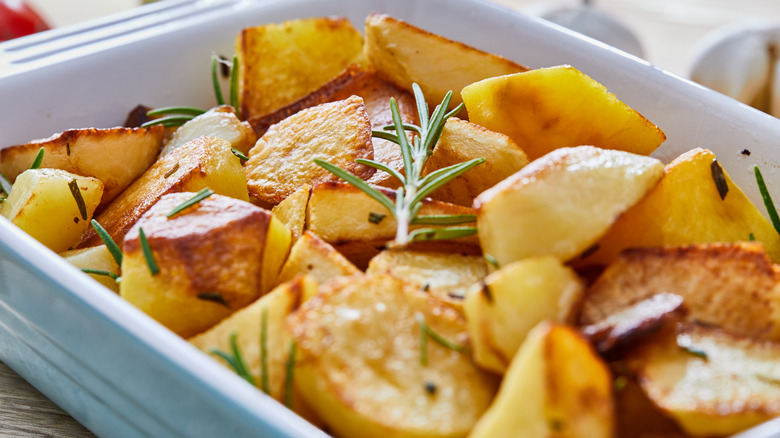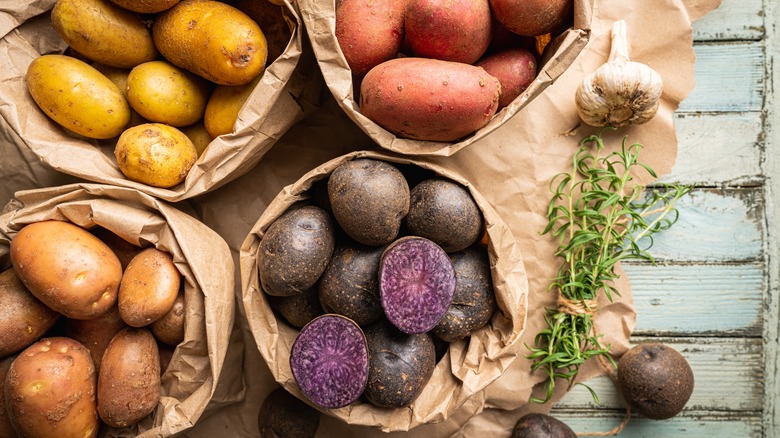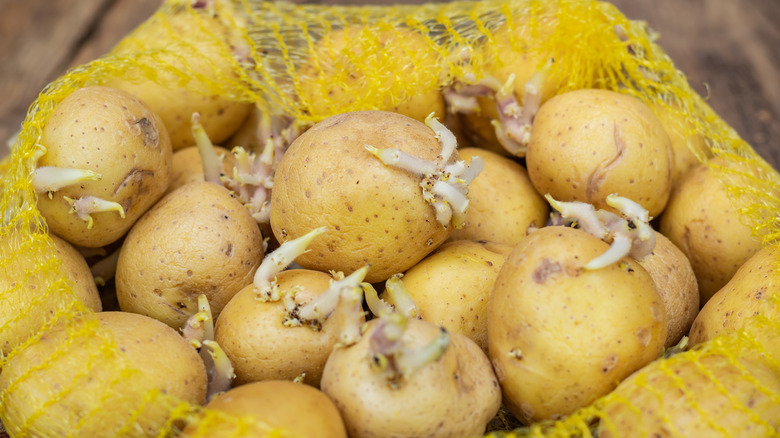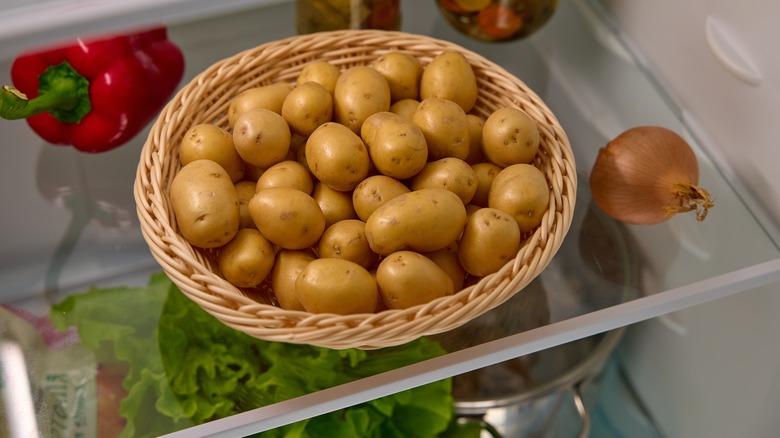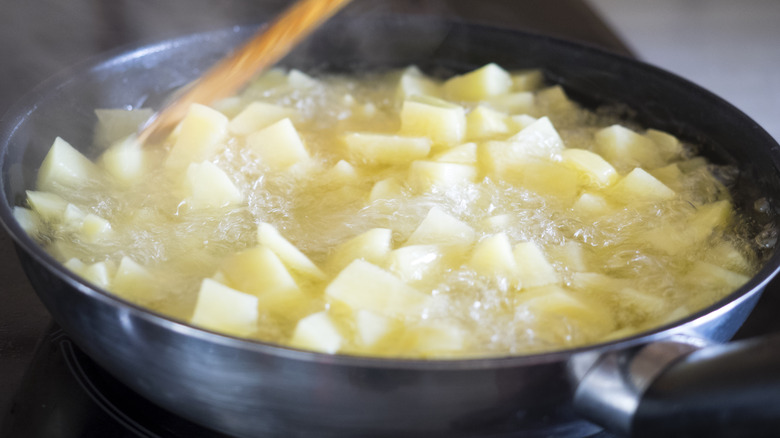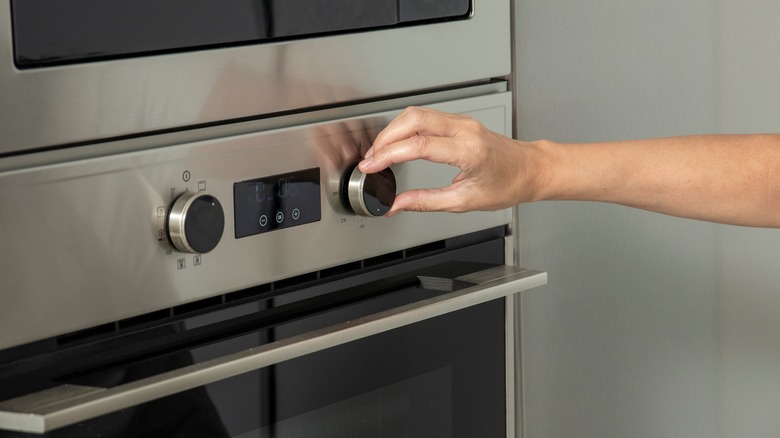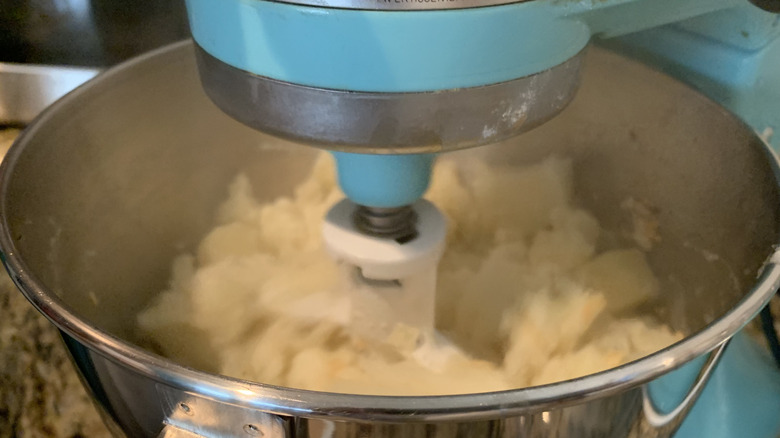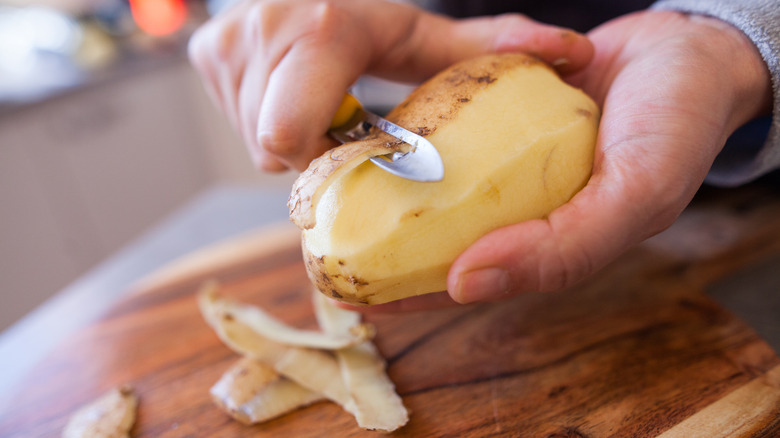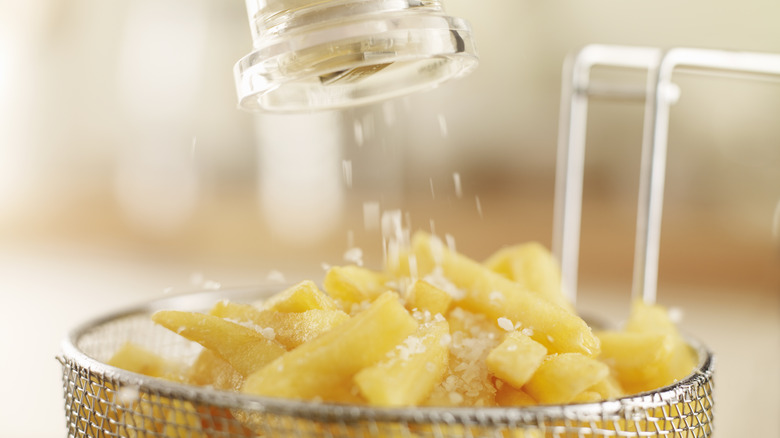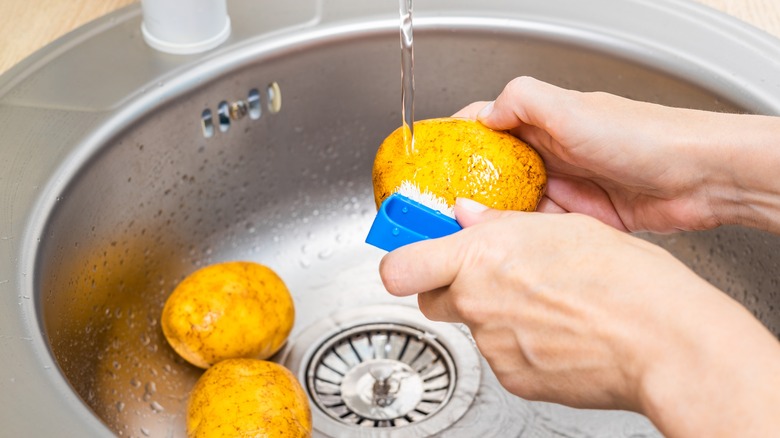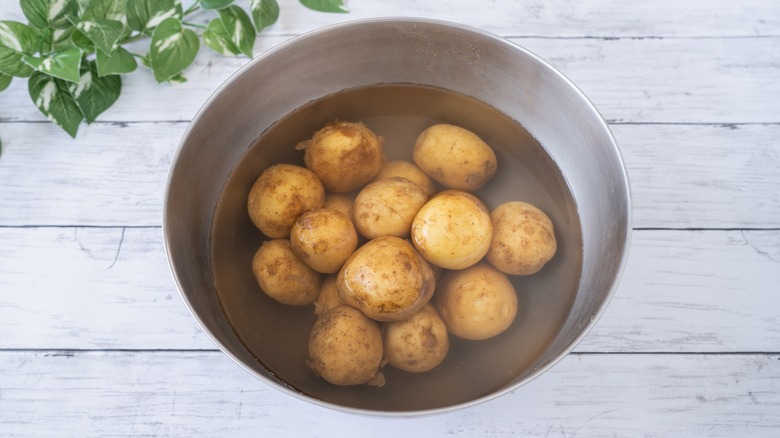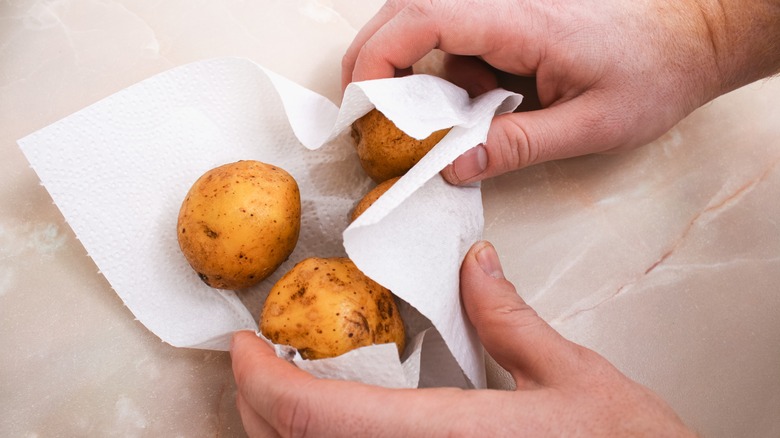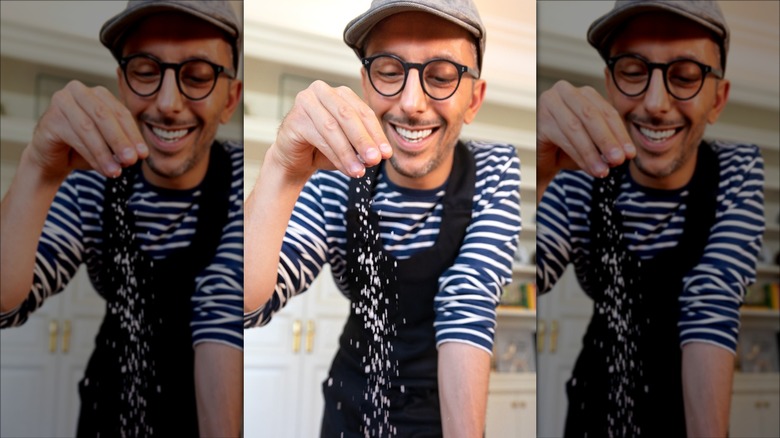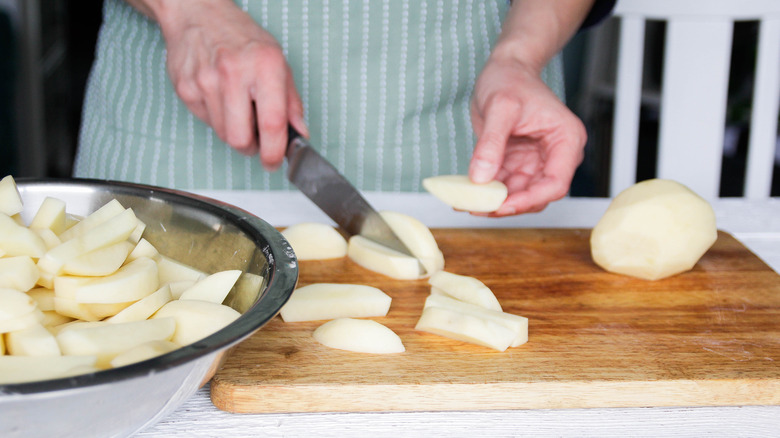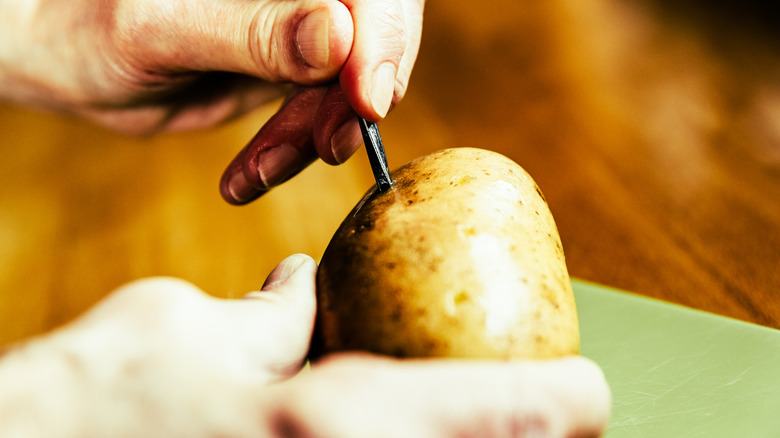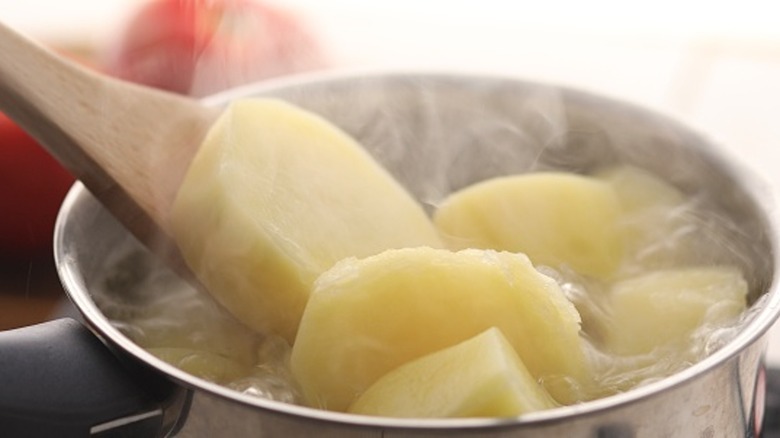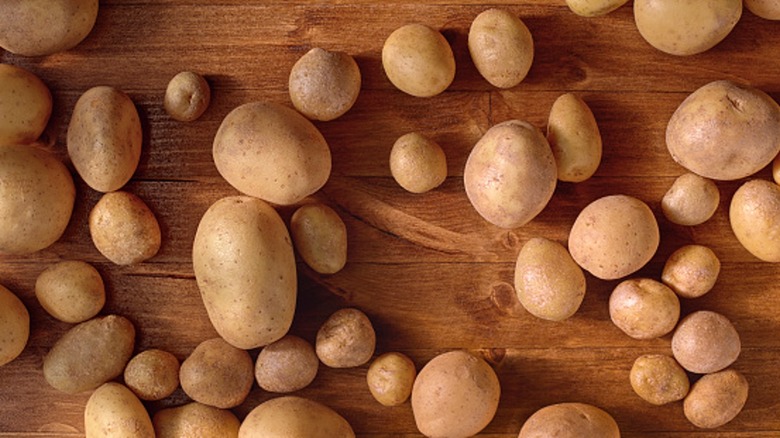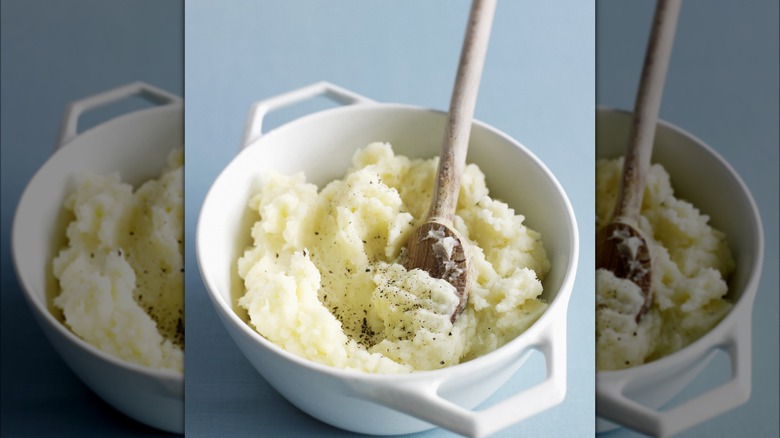Experts Chime In On The Mistakes Everyone Makes When Cooking With Spuds
Whether you consider yourself a seasoned home chef or only cook because you have to eat, chances are pretty good that you've prepared potatoes many times. Potatoes are a versatile and popular root vegetable. We boil, roast, mash, or bake them to make various dishes, including french fries, mashed potatoes, scalloped potatoes, shepherd's pie, and so many others. However, despite their prevalence in many cuisines, cooking potatoes is not foolproof. Several mistakes can turn a tasty spud recipe into a disaster.
So, we reached out for expert guidance and tips on avoiding these precarious potato problems. Three professional chefs offered their insights and recommendations: Sylvia Graf Carrethers, a personal chef and owner of Simply Prima; Kevin Ashton, a chef and Culinary Advisor at Restaurantji; and Ranveer Brar, a celebrity chef at Kashkan Indian Kitchen by Ranveer Brar. We also spoke with Gabrielle Marie Yap, senior editor and culinary entrepreneur at Carnivore Style.
Not choosing the right potato for your dish
If you've wandered through the produce section at the grocery store, then you probably know that there are several different types of potatoes. Assuming all these varieties are the same is a mistake you'll want to avoid making. For example, Kevin Ashton explains, "Red potatoes and gold potatoes are traditionally used for sauntering or roasting." Both of these varieties have a waxier texture, helping them maintain their shape when cut into chunks for roasting.
Sylvia Graf Carrethers also underscores the importance of matching your intended cooking method with the right type of potato. She recommends russet potatoes for baking because of their larger size and mealy texture. For potato salads, Carrethers says to opt for red, Yukon, or other waxy potatoes that will not fall apart or disintegrate when cooked. She also explains that she uses "Yukon gold for [her] mashed potatoes as they have a buttery texture and pair well with butter and milk for the mashed potatoes."
Using potatoes that are too old
While some old potatoes may not look that different from the fresher ones at the grocery store, there are in fact differences that can negatively impact the overall taste or texture of your finished dish. "As they age, potatoes start to lose moisture and develop a mealy, starchy texture that's just not ideal. The flavor also tends to get a bit dull and earthy," shares Gabrielle Marie Yap.
Instead, Yap says, "look for potatoes that are firm, with smooth, unblemished skin." She recommends avoiding sprouted potatoes as well as any with wrinkles or green spots. Potatoes that feel relatively heavy given their size may also be a better pick."
Storing potatoes in the refrigerator
While you may know that it isn't good to store onions and potatoes together, did you know that you should avoid storing potatoes in the refrigerator? According to Ranveer Brar, "Storing potatoes in the fridge can cause their starches to convert to sugar more quickly. This not only affects the taste, making the potatoes overly sweet but can also impact the texture, making them more likely to turn out gritty or uneven when cooked."
If you want to avoid that potentially catastrophic consequence the next time you go to make mashed potatoes, baked potatoes, or scalloped potatoes, choose a better storage location. Brar recommends keeping potatoes in the pantry or another location in the home where it is cool, dry, and dark. He explains that doing so "will help maintain their natural starch balance and keep them fresh for longer."
Dropping the potatoes in boiling water
When you make mashed potatoes or boil potatoes for potato salad, do you bring the water to a boil before adding the potatoes to the pot? If so, you've just discovered a mistake you've been making. Kevin Ashton explains, "When cooking starchy foods such as potatoes, it helps to be careful not to overcook the outside before the inside becomes tender." If you put the chunks of potatoes into water that's already boiling, the outside will cook more quickly. Once the inside of the potato has finished cooking and turned tender, the outside will likely have turned to mush.
To avoid this problem, Ranveer Brar says, "Always start by placing potatoes in cold water, then bring them to a gentle boil." Following this advice, the potatoes will cook much more evenly, ensuring a consistent texture throughout. You can even prep ahead and keep your peeled potatoes in water until you're ready to cook them. Just don't leave them in water for more than 24 hours, and be sure to refrigerate the pot if you're prepping more than an hour or two ahead of cooking them.
Baking potatoes in an oven that is too hot
If you're tight on time or forgot to leave enough time to cook your baked potatoes, it can be tempting to crank up the oven temperature to speed up the process. However, this won't have the result you want. Sylvia Graf Carrethers explains, "If the oven is too hot, when you bake your potatoes, you risk the potatoes drying out before they are soft enough."
One idea that Carrethers shares to avoid dried-out potatoes is to pre-cook them in the microwave for a few minutes (after piercing them). She says, "Then I rub them with oil and finish them in a 400 degree Fahrenheit oven to crisp up the skin."
Overmixing or over cooking mashed potatoes
It is easy to overmix mashed potatoes. However, you want to be careful to avoid mixing too much because, as Ranveer Brar explains, it causes "the starches [to] break down too much, resulting in a gluey, gummy texture rather than the desired creamy and fluffy consistency." Instead, Brar is a fan of using a potato masher or ricer to mash the potatoes by hand to avoid accidentally overmixing them. He says, "Add ingredients such as butter and cream slowly, stirring gently until the mixture is light and fluffy."
Just as you shouldn't overmix potatoes, you also shouldn't over (or under) cook them. Gabrielle Marie Yap explains that undercooking can result in lumpy or grainy mashed potatoes, while overcooking can leave your potatoes waterlogged. To avoid this mashed potato mistake, Yap explains, " I usually recommend cutting the potatoes into 1-inch cubes, then simmering them in salted water for 15-20 minutes. You'll know they're done when you can easily pierce them with a fork."
Always peeling your potatoes
Contrary to popular belief, you do not always need to peel potatoes — even for recipes like mashed potatoes. Kevin Ashton explains, "Keeping the skin not only adds a unique texture to your dish but is also healthy." The skin holds around half of the potato's total fiber content, and adding it to your diet can support digestive health.
Sylvia Graf Carrethers highlights another reason not to peel potatoes, which is related to making potato salad. She says, "If you peel your potatoes before you boil them, the potatoes will absorb too much water and result in a mushy potato salad." If you don't want to leave the skin on the potatoes for your salad, Carrethers recommends peeling after boiling.
Not seasoning the potatoes properly
Both Kevin Ashton and Gabrielle Marie Yap warn about the pitfalls of incorrectly seasoning potatoes. Ashton explains that because they are so starchy, you must use enough salt (he recommends about 1 tablespoon for each pound of potatoes). "Under-seasoning means that only the outside of your potatoes will taste good," he says.
Yap adds to this advice, noting the importance of salting the water at the ideal time during the cooking process. She says, "I've noticed a lot of people add salt at the end, but this can make the bites taste bland. Instead, think about seasoning the potatoes before they go into the heat." Even if you are not using a boiling method to cook your potatoes, Yap's advice to season at the beginning of the cooking process remains the same. She says, "For roasting, toss them in oil and seasonings before you put them in the oven."
Not washing potatoes before cooking
If you haven't been washing your potatoes before peeling them, now is the time to change your habits. Gabrielle Marie Yap explains, "Many people skip this step altogether, thinking that the skin will be peeled away or that the cooking process will take care of any dirt."
Unfortunately, peeling doesn't remove all the dirt and bacteria and can still contaminate your finished dish. As you run the peeler over the potato, you'll likely transfer some bacteria from the skin to the potato flesh, potentially exposing you and others to harmful pathogens. Instead, use a vegetable scrub brush to thoroughly clean the skin before peeling your potatoes.
Not soaking potatoes
When you make homemade french fries or potato chips, are you disappointed that they aren't as crispy as you would like? If so, Gabrielle Marie Yap says you might be skipping an important step before preparing them. "I've noticed that some [cooks] skip the soaking step entirely, which can result in a less-than-desirable texture."
To achieve the perfect texture, Yap recommends soaking the potatoes for about half an hour in a bowl of cold water. She explains that this process "helps to draw out excess starch, leading to a crispier finish." Yap also reminds us to dry off any leftover dampness on the pre-soaked spuds before cooking them.
Not drying potatoes before baking them
Whether you're soaking your potatoes or simply washing and peeling them, Kevin Ashton shares that it is imperative to dry them off before you bake them. He says, "The presence of moisture on the potato surface before baking can lead to steaming rather than baking, preventing the skin from becoming crispy."
To avoid this issue, simply take a few additional minutes to pat the potatoes dry with a paper towel before putting them in the oven. "A dry surface allows the potato skin to crisp up beautifully in the oven, adding a delicious contrast to the fluffy interior," shares Ashton.
Not cooking spuds over salt in the oven
If your baked potatoes always seem burnt or not properly cooked, Kevin Ashton says you may be skipping a crucial yet simple step when getting them ready for the oven. He says, "Consider sprinkling a bed of salt on your cooking sheet before placing the spuds in the oven."
Ashton recommends creating a bed of kosher salt over your baking sheet about ½-inch thick. He explains, "The salt helps your potatoes to cook evenly and prevents them from coming in direct contact with the cooking sheet." When used in this manner, the salt effectively works as an insulator. As the potatoes cook, the salt helps prevent moisture from escaping, sending it back into the potato to keep them moist and, in turn, keeping all the flavor where it should be — in the spud, not on the pan. Additionally, the salt slows down how quickly the potatoes cook, which can result in a more evenly-cooked dish.
Cutting potatoes into uneven sizes
Whether you're making roasted potatoes, mashed potatoes, potato salad, or practically any other dish that requires you to cut the potatoes before baking or boiling, don't make the mistake of cutting them into randomly-sized pieces. If your potato chunks are not evenly sized, Gabrielle Marie Yap explains, "This usually ends up with some pieces getting overcooked and others not getting cooked enough, especially when you're boiling or roasting."
Instead, Yap recommends spending a little extra time over the cutting board to make sure you are carefully, and evenly, slicing or chunking the potatoes. She adds, "This not only promotes even cooking but also enhances the presentation of your dish, making it more appealing."
Forgetting to pierce potatoes before baking them
Think about the last time you made baked potatoes. Did you simply toss them in the oven or just wrap them in foil before baking? If so, you skipped the crucial step of piercing them a few times before baking. According to Kevin Ashton, "Potatoes have a relatively high water content. When heated, the water turns to steam. If the steam has no escape route, it can cause the potato to explode."
Obviously, this is not something you'll want to deal with when preparing the rest of your meal. Avoid the issue by following Ashton's advice and using a fork to piece each potato several times before putting it in the oven. "The holes you create allow steam to escape safely and ensure even cooking," says Ashton.
Not pre-boiling for crispy home-fried potatoes
Crispy home-fried potatoes — what's not to love about those? However, achieving such a crisp texture isn't always so easy. Fortunately, Sylvia Graf Carrethers has a solution that will help. She says, "For the best crispy home-fried potatoes, boil them the day before." She recommends leaving the skin on while boiling.
Carrethers explains that you should then let them cool in the refrigerator overnight. Then, once you're ready to prepare your meal, she says, "Peel them, cut them into thin slices, sauté onions and bacon, if desired, and add your potatoes to make them extra crispy."
Baking potatoes of varying sizes at the same time
When you shop for potatoes at the grocery store, you've probably noticed that some are much larger than others — even within the same potato variety. Kevin Ashton advises against trying to bake potatoes that are not even in size at the same time. He says, "Baking potatoes of different sizes together can result in uneven cooking, with smaller potatoes overcooked and larger ones undercooked."
Instead, try to choose potatoes as close to the same size as possible. Ashton says if you can't find evenly sized potatoes, "Consider starting with the larger ones or cutting them into smaller, uniform pieces to ensure they all cook at the same rate."
Not knowing the best way to reheat potatoes
Understanding how to reheat your leftover potatoes will ensure they taste as close to freshly cooked as possible. Sylvia Graf Carrethers explains that the best reheating method can vary based on the type/style of potatoes you initially prepared. For example, she says, "Baked potatoes can be reheated covered in aluminum foil in a 350 degrees Fahrenheit oven for 10 to 15 minutes." On the other hand, she recommends using the air fryer when reheating crispy potatoes. Set it for about 3 to 5 minutes, depending on the thickness of the potatoes, to maintain their deliciously crispy exterior.
While you shouldn't reheat pizza in the microwave, Carrethers explains that it can be used to reheat mashed potatoes. Alternatively, she says, "You can repurpose them and mix 2 cups of mashed potatoes with 1 egg yolk and ¼ cup of flour. Form into pancake-like patties and fry them in a pan." Another option is to freeze your mashed potatoes to use in the future.
